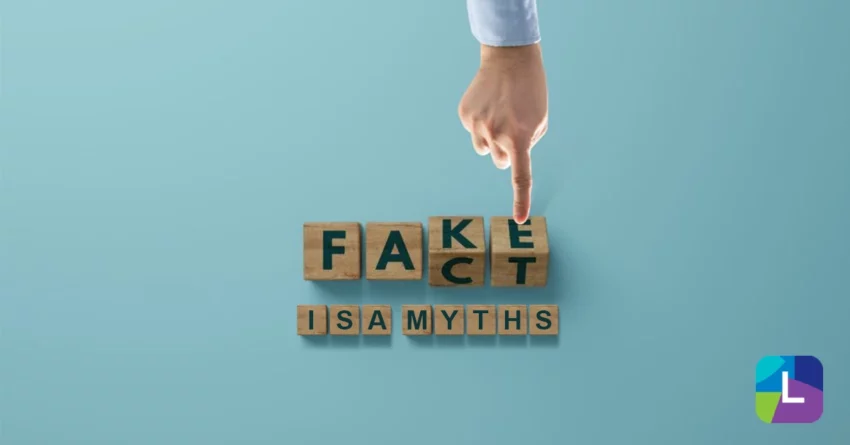Common ISA Myths That May Be Holding You Back
We’re approaching that time of year again when advertisements on buses, taxis, social media and the radio are all screaming ISA at you.
But with all those advertisements, a lot of financial institutions fail to fully explain the full extent of what an ISA is and bust the common myths associated with the tax-wrapping investment scheme.
The current tax year ends on April 5th, and the new tax year period begins on April 6th 2024.
Luckily, misconceptions about ISAs are easily explained. So let’s bust 10 common ISA myths that have bounced around.
#1 You need a lot of money to open an ISA
Everyone in the UK has the same ISA allowance limit. 2022/23 & 2023/24 saw a limit of £20,000 across all the ISAs (and £9000 for a Junior ISA). The 2024/25 ISA allowance has remained the same at £20,000, and this will apply to everyone eligible to open or invest in an ISA.
However, you don’t have to invest the full allowance if you don’t have the financial stretch. There are many different types of ISAs available to the public with many different amounts required to open accounts. As Leeds Building Society1 quotes, “some ISAs can be opened from as little as £1” but the more you invest, the more you can earn.
#2 ISAs are cash savings
There are four types of ISAs you can invest in. These are:
- Stocks & Shares ISA
- Cash ISA
- Lifetime ISA (up to £4000)
- Innovative Finance ISA
There is a Junior ISA that you may open for your children and you can invest up to £9000.
You have the freedom to choose to invest your allowance into a single type of ISA or diversify your investment across all four by splitting your allowance.
| Type of ISA | Allowance Limit | Covered by the FSCS |
|---|---|---|
| Cash ISA | Up to £20,000 | Yes |
| Lifetime ISA | Up to £4000 | Yes |
| Stocks & Shares ISA | Up to £20,000 | Yes |
| Innovative Finance ISA | Up to £20,000 | No |
| Junior ISA | Up to £9000 | Yes |
#3 You can only open or invest in one ISA
There is a misconception that you can only open or invest in one ISA. While this sentence does ring some truth, it’s nearly incorrect.
As Barclays2 points out, you can choose to invest your whole (or as much as you financially can) into one type of ISA. You may also choose to diversify your investment and invest in all four types of ISAs (if eligible).
For example, if choose to only invest in a Cash ISA, you have the right to invest as much as you want during the tax year up until you reach the allowance limit. So you may choose to invest £1000 in May, and you can choose to invest £1000 three more times throughout the tax year.
However, you cannot invest in two of the same types of ISAs during the same tax year. This means you cannot invest in an existing Cash ISA and open a new Cash ISA in the same year.
If you accidentally open or invest in two similar ISAs, you need to contact the ISA provider and HMRC as soon as possible.
#4 Opening an ISA is complicated
While the application process may seem long, it’s not complicated at all. You will need to have a few documents on hand but the rest should be relatively straightforward.
Before opening an ISA, make sure you tick the following boxes
- Be 16 or over to open a Cash ISA
- Be 18 or over to open a Stocks & Shares ISA and an Innovative Finance ISA
- Be 18 or over but also under 40 to open a Lifetime ISA
- Be a UK resident
or
- A Crown servant (working overseas in the civil service) or their spouse/civil partner if you do not live in the UK
#5 Best time to open an ISA is X period
You will most likely hear about ISAs at the end of a tax year because the deadline is looming, but it’s not necessarily a bad time to open one. Despite that, many people choose to squeeze open an ISA to make some final contributions or make the most of the current allowance, but you can open an ISA at any time.
As Trustnet3 quotes, “The sooner you open your ISA, the sooner you could be earning interest on your savings or investments.” In addition to starting early, it can showcase a better understanding of its performance and if it’s worth investing more into that ISA.
#6 If I open an ISA, I’ll have to do a tax return
Tax is one of the biggest fears for potential investors when it comes to ISAs. But if you’re new to the scheme, the entire goal is to be tax-efficient. That means you do not get involved with any tax-related issues because any gains in an ISA are covered by a tax-free** wrapper.
An ISA also brings compound interest in the form of returns or dividends which you can use to reinvest, helping to increase returns and ease the pedal of work as you edge into your retirement life.
As Unbiased4 help points out, “ISAs do not have to be recorded on your tax return.”
#7 You need to instantly decide where to invest
The good thing about investing is you can add money when and where you decide to invest. You don’t necessarily have to invest in an ISA or into a stock (in a Stock & Shares ISA) if it doesn’t fit your financial goals.
But before making any drastic decisions, you should speak to an independent financial advisor and do diligent research to find your financial goals and routes to achieving them.
#8 ISAs carry too much risk
While this is somewhat true, it’s not entirely correct. You as the investor have the opportunity to view and compare various ISAs which fit your financial goals. By completing your diligent research, you can find which ISAs would suit you best and how you would like to divide your ISA allowance.
However, there are risks to investing. Below we will break it down for you:
Cash ISA
A major push behind a Cash ISA is there is no risk of capital loss because cash isn’t being invested. However, if the interest rate being paid to you is less than the rate of inflation, your investment pot is essentially losing value. This means you won’t technically be losing money, your money-buying power lessens as time goes on.
Stocks & Shares ISA
Similarly to a non-stocks and shares ISA, any investments carried in an SSISA carry the risk of losing money. Any previous market performance should be taken into consideration when carrying out the investments.
If you are an active trader, you should look out for low trading charges as each time you buy or sell, you can be charged anywhere from £0-50 depending on the platform.
Before investing, make sure you do diligent research into how the stock market works and speak to an independent trader or financial advisor before investing and running the risk of losing money.
Lifetime ISA (LISA)
A Lifetime ISA is used primarily for two reasons; buying your first home or another source of income until the age of 60.
There are two different types of LISAs, a Cash Lifetime ISA (CLISA) and an Investment Lifetime ISA (LISA). A LISA carries risk as investments can go up and down. But if you are planning to save for retirement, an ILISA may be the better option.
A CLISA carries no risk and is subject to earning interest similar to a normal savings account. Those who invest in a CLISA typically aim to purchase their first home.
However, if you withdraw your investments from either LISA type will result in penalties. First, you will lose the 25% government contributions. Secondly, you will also incur penalty fees from the provider to release your funds, this amount can vary from provider to provider.
Innovative Finance ISA (IFISA)
An Innovative Finance ISA is a peer-to-peer lending ISA. As such, any investments carried through run the risk of losing some or all of your money. However, as a high-risk investment, you may be able to reap the rewards of returns between 8-10%. These high returns attract many from the traditional IFISA looking for a greater return against the rate of inflation.
Financial Services Compensation Scheme
Now you know certain risks involved, you should understand the Financial Services Compensation Scheme (FSCS). FSCS protects customers when authorised financial services firms fail. You can be entitled to compensation of up to £85,000.
However, any IFISA investments are not protected by the FSCS, so any investments with an IFISA firm that fails may be instantly lost.
#9 You can’t take your money out
Many ISA schemes with lock-in periods will penalise savers for taking money out early. But, you can take your money out whenever you want, whether this is to transfer into a new ISA or withdraw for cash.
But you should be made aware withdrawing can bring charges depending on your provider. Before withdrawing, you should speak to your provider in case you incur any penalty charges.
#10 Need to keep your ISA for a long time
You can hold many different types of ISAs throughout your lifetime. However, if you have spotted another ISA provider with a better range or benefits for you, then you have the option to transfer an ISA to your new provider. For this, you’ll need to complete an ISA transfer form. But before doing so, you should also be aware you may incur penalty fees if you move any fixed-term ISAs, or if there are any exit fees.
You can decide to move your current ISA to the same type or move it to a different ISA type. Update: As Money5 quotes, “It’s always a good idea to see what rates are being offered,” as this can help maximise your earning potential or grab a good deal.
Lendwise IFISA
Support postgraduate education on the Lendwise platform. Help make a bright difference to ambitious postgraduate students. *Explore investment options today.
Check our Lender terms and conditions.
**The tax treatment of interest and reliefs on defaults may be subject to change and tax treatment will depend on your individual circumstances.
⚠️ Don’t invest unless you’re prepared to lose money. This is a high-risk investment. You may not be able to access your money easily and are unlikely to be protected if something goes wrong. Take 2 mins to learn more. https://lendwise.com/invest/education
- 6 ISA myths debunked. Leeds Building Society. https://www.leedsbuildingsociety.co.uk/knowledge-base/savers/common-misconceptions-isas/. Accessed 8 March 2023 ↩︎
- Five ISA myths exposed. Barclays. https://www.barclays.co.uk/smart-investor/accounts/investment-isa/five-isa-myths-exposed/. Accessed 8 March 2023. ↩︎
- Ten common myths about ISAs you need to ignore. Trustnet. https://www.trustnet.com/news/584581/ten-common-myths-about-isas-you-need-to-ignore. Accessed 8 March 2023 ↩︎
- Top 10 myths about… ISAs. Unbiased. https://www.unbiased.co.uk/news/isas/10-myths-about-isas. Accessed 8 March 2023 ↩︎
- ISA myths and the truth about tax-free savings. Money. https://www.money.co.uk/savings-accounts/isa-myths-and-the-truth-about-tax-free-savings. Accessed 20th October 2023 ↩︎




